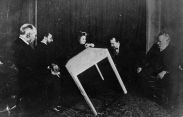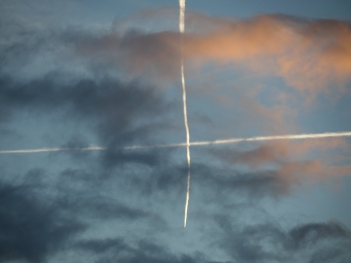 My last post was a very brief answer to an article in the Shields Gazette on Thursday, 26th March 2015, in which Mike Hallowell complained that I have criticised his anti-scientific beliefs. I said I would give a fuller answer to his article on the Bad Thinking blog because his original article has not been published on the Gazette’s website. I obviously don’t have a right to reply there, but at least I can reply here.
My last post was a very brief answer to an article in the Shields Gazette on Thursday, 26th March 2015, in which Mike Hallowell complained that I have criticised his anti-scientific beliefs. I said I would give a fuller answer to his article on the Bad Thinking blog because his original article has not been published on the Gazette’s website. I obviously don’t have a right to reply there, but at least I can reply here.
Mike reckons he doesn’t have a problem with science itself, it’s the “culture that often surrounds it” that bothers him.
Mike says:
I don’t mind scientists telling me what they’ve discovered, but what I don’t take kindly to is being told what I should believe.
Give me the facts, but don’t get heavy-handed with me and tell me how I should interpret them.
In all probability I’ll bow to the expertise of scientists, but I reserve the right not to on occasion. And that’s what some individuals don’t like.
All creationists are happy to accept what science has to say, but only up to a certain point: if science comes up with something that happens to contradict a religious believer’s faith, then that is where their acceptance of scientific discovery stops.
Mike is under no obligation to believe what science has to say about anything, but what “some individuals don’t like” is the campaigning by many creationists to have religion taught in science classes. Religion and science are totally separate issues that are simply not compatible with each other.
Similarly, the so-called “debate” between evolutionists and creationists is a non-issue, except for the creationists. If they want to believe that a god or gods created the universe and the life within it, no one is stopping them from following their religious beliefs. Science would quite happily ignore religion if only religion would keep itself to itself. Unfortunately, religions do not produce new knowledge; what the religious believe is already written down and it would be considered blasphemous to question holy scriptures, so nothing in religion is going to be tested, questioned or changed in the light of new scientific research. Creationism is simply not scientific, and “creation science” is just an oxymoron.
I find it ironic, however, that the religious – like Mike in his article – refer to what they call “scientific dogma.” At the same time, they also claim – like Mike does in his article – that science changes, even to the point of discarding ideas that were eventually found to be wrong. He says science is dogmatic, in an article where he also says it is always changing. He appears to see no contradiction there.
But what about those scientists he mentions who had religious beliefs? After moaning that I have said in the past that if creationists could be reasoned with, there would be no creationists, he says;
I don’t know about you, but I find that sort of attitude appallingly arrogant, for it forces us to presume that great minds like Galileo, Kepler, Pascal, Newton, Herschel, Joule, Pasteur and Kelvin were so beyond the pail (sic) of rational thinking that they could not be reasoned with.
As far as I have been able to determine, all of these geniuses believed in a creator.
What Mike says there is simply a red herring – a rhetorical device intended to divert his readers’ attention. Perhaps all the scientists he lists were believers in a creator; Isaac Newton in particular was a devout Christian, but he saw himself as merely discovering and describing what he believed was his god’s creation. Nowhere in his scientific writings does he invoke any supernatural explanation for any of his observations. Other scientists don’t appeal to the supernatural either.
The same applies when a similar argument is utilised with regard to the USA, for instance. Yes, it is a world leader in science; it is also a very religious (primarily Christian) country. But its scientific accomplishments are despite, not because of, the religiosity of its citizens. The science is done by (mostly godless) scientists, not by those who are motivated by, and seek, supernatural explanations for what we see in the world and the universe around us. The US constitution keeps religion out of state schools and universities. Keep in mind the fact that scientific breakthroughs come from purely secular institutions, not Bible colleges or any other religious organisation.
Natural events can be explained by natural causes, and you will not find any legitimate scientific research report appealing to the supernatural as a cause for anything. Whether the religious like it or not, science progresses while religion stagnates.
Mike then comments:
Swiftsure also admits that science “is not a perfect system” but if it isn’t perfect, why should people be ridiculed for rejecting some of the things science currently teaches?
It’s true that science isn’t perfect, but it’s the best system we have to find out about the objective reality that is out there. Those who reject science are ridiculed when they make claims that are, well, ridiculous.
Using the same oxymoron as above, Mike continues:
Many creation scientists have been bullied, harassed and threatened because they reject the theory of Darwinian evolution.
The point here, though, is that the people he refers to are not doing any actual science anyway. It’s a classic example of people who think their beliefs have – or should have – equal standing with empirical research, whining that science ignores them. If they could come up with solid evidence to support their beliefs rather than just trying to nit pick perceived faults with evolutionary theory then they would be taken seriously. But trying to replace established and well tested biological science with “God did it” isn’t good enough. Strong faith is regarded as an admirable characteristic in religion, but in science faith is a weakness (even a liability) not a strength.
Mike’s next comment merely illustrates that he is talking about things he does not understand:
I don’t get angry in the least when I hear people deny creationism, but I openly confess I do not like the high-handed, arrogant and often venomous way in which some evolutionists belittle those who do not agree with their views on the origin of life.
This is the standard trope of the typical uninformed creationist, who thinks that science is trying to compete with their particular god or gods. For Mike Hallowell’s benefit, let me make this point clear: no one knows how life originated. Science makes no claims about how life began (although there are people working on it). The theory of evolution has nothing to say about how life started. Evolution is a science that investigates how life evolved after it began, not how it came about.
The next thing Mike says is possibly the most eye-rolling of his diatribe:
We’re told science is “self-correcting”, [Mike is referring to me, again, informing him of that], but that’s a process which only works if one allows for dissent and open debate.
And you can’t have open debate if you believe those who disagree with you are too stupid to be reasoned with.
Creationists who disagree with science with regard to evolution are in the same situation as someone who disagrees with the accepted “dogma” that an internal combustion engine has to be operated with petrol or diesel fuel. Dissent and open debate are regular features of science – but that happens between scientists, who do change and adapt their theories in response to new evidence. But should a non-engineer who has no training in, and knows nothing about, engines be “debated” with? Such a person obviously can’t be reasoned with. That doesn’t mean they are stupid, but their ignorance can hardly be denied.
Mike is still on his high-horse, however. He says:
Many creation scientists have been bullied, harassed and threatened because they reject the theory of Darwinian evolution.
I don’t know about any literal bullying, harassment or threats that Mike mentions, although those people might interpret the rejection of their anti-scientific views as being that. In reality, creationists cannot get a foothold in academia for the simple reason that the very concept of “creation science” is a non-starter as a method of discovery. The only thing creationists do is to try to pick faults with existing evolutionary theory – particularly in areas where there is genuine disagreement between real scientists. Where there are areas in which scientists don’t know yet what is happening, creationists fill those gaps in knowledge with the all-encompassing and untestable “God did it.” The true purpose of creationism is to get rid of any aspect of science that contradicts the actual dogma of religion.
But Mike isn’t finished yet:
No matter how convinced you are about the wonders of science, just remember: behind every currently accepted scientific doctrine lies a long trail of discarded ones which seemed just as sensible in their day.
Unlike religion, of course, where the battle against disease and every other adversity we come across is fought the same as it always was: with faith, prayer and an assortment of rituals and incantations.
Science itself didn’t actually start on any particular date; it began when thinking people started to question religion. A drought was never overcome by prayer, for instance, but some people reasoned that bypassing gods and digging irrigation ditches would work – and it did. While some people were offering worship to their god during an outbreak of cholera, others were actually doing something useful – finding a source of clean water that was not contaminated with whatever was actually causing the disease. Those people were wrong when they thought cholera was caused by a miasma – a bad smell – and they discarded that idea when they found out about germ theory. Yes, that’s pretty much how science works – by keeping what works, and discarding what doesn’t. But Mike sees that as a bad thing.
Before science as we know it now, people were lucky if they lived to their mid twenties. It is the advancement of science that has brought us out of the dark ages, but it is the unchanging dogma of religion that would take us straight back there. And it might yet succeed. Mike, according to his article, is clearly also a global warming “sceptic,” (read, denialist) and he has the same complaints about science and what it has to say on the matter.
Unfortunately, the anti-science lobby is very influential, supported by religion and vested interests. However, when the rising water levels on this planet start lapping around the denialists’ ankles, they might start to pray, but by then it might also be too late. We have a realistic chance of avoiding disaster if we act now by listening to, and acting upon, what science has to say about it.
When the Earth becomes a water-planet with most of what is left of the land a parched wilderness, science will be able to do no more than say, “I told you so.” And the religious will replace their failed prayers with, “It was God’s will; we can’t do anything about it. Praise the Lord.”
If religion would stop trying to interfere with reality, we would all – including the religious – be much better off.
Meanwhile, here is a snapshot of our evolutionary history. No one is being told they have to believe it, it just happens to be true whether you believe it or not.

Addendum: This is strange; the above article is now on the Gazette website here:
http://www.shieldsgazette.com/opinion/columnists/kicking-up-a-stink-over-origins-of-life-1-7178249#comments-area
It doesn’t appear on any of my feeds on any of several computers I use in different locations on different networks, and I came across it only by chance when I was looking for something else. Nevertheless, you can now click over there and read it; there are some interesting criticisms (at least there are at the moment; it’s not unknown for the Gazette to remove criticisms, so read now while you have the chance).

 Time will tell if a newer face in the psychic firmament will have similar luck. Gary Mannion, spiritualist, psychic surgeon and allegedly a lot of other mystical things, was recently caught in a similar manner, but this time not in front of witnesses (who were actually there but couldn’t see a thing in the complete darkness), but caught out by an infrared camera secretly filming the proceedings.
Time will tell if a newer face in the psychic firmament will have similar luck. Gary Mannion, spiritualist, psychic surgeon and allegedly a lot of other mystical things, was recently caught in a similar manner, but this time not in front of witnesses (who were actually there but couldn’t see a thing in the complete darkness), but caught out by an infrared camera secretly filming the proceedings. 









